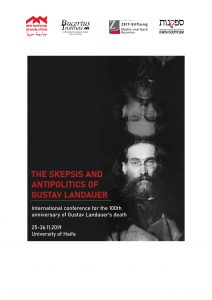 The Antipolitik of Gustav Landauer (Dr. Cedric Cohen Skalli)
The Antipolitik of Gustav Landauer (Dr. Cedric Cohen Skalli)
Gustav Landauer (1870-1919) was a German-Jewish anarchist and a radical thinker who was brutally murdered by the Freikorps (Free Corps) at the end of the Munich Räterepublik on 2nd of May 1919. In the early 1920s, Martin Buber published Landauer’s essential works in four volumes and they received much attention during the years of the Weimar Republic. During WWII and in the post-war period, Landauer was an almost forgotten figure for most of the rest of the 20th century, even though his ideas exerted an indirect influence on the development of Jewish thought, especially regarding the rehabilitation of utopian, messianic, anarchical, and mystical elements. In the aftermath of 1968, Landauer was rediscovered by different movements of the New Left and, in the 1990s, after the collapse of the Communist bloc, Jewish political thought paid great attention to him.
The specific eclecticism of Gustav Landauer is not easy to grasp. He was a fin de siècle writer, a translator, a politician, a journalist, a political thinker, and a revolutionary figure who had an important role in late 19th and early 20th century Germany. This complexity goes along with the fact that Landauer was not a socialist and a revolutionary in a regular sense, as his opposition to WWI, to Bolshevism and to the new Weimar Republic showed. Indeed Landauer refused until his death to surrender to party politics or to employ the revolution as a technique in order to seize and secure power. Paradoxically, Landauer endorsed a view of social change he labelled “Antipolitik”, which fought against modern hypertrophy of politics and attempted to free people and societies from the abstract “state entities”. Landauer aspired to a revolutionary return to a communal life that did not rely on the modern separation between caring for the body and caring for the spirit, and whose principle of organization was both immanent and spiritual.
Given his distrust of modern politics, it is no surprise to find in Landauer’s work, and particularly in Skepsis und Mystik (1903), great attention to and interest in skepticism. In our view, this Skepsis is the thread that ran through all his political and philosophical thought. However, this feature has not received proper attention by scholars, who mainly underline Landauer’s peculiar account of anarchism and mysticism, together with his conception of revolution and community. In his Skepsis und Mystik, Landauer recognizes that linguistic skepticism is the ground for a new political action, based on a radical critique of human superstitions, Wortaberglauben. According to him, calling into question the power of language would lead to a new understanding of community. He therefore uses linguistic skepticism as a political strategy for an antiauthoritarian critique and a complex mystical thought of community, in which the individual is indissolubly bound to the entire past and present of humanity.
One century after his death, in a time marked by deep doubt concerning the outcomes and expectations of modern politics, and by 20th century linguistic turn, we would like to devote this international conference to the complex articulation of Skepsis and Antipolitik in the multifaceted features of Landauer’s life, his thought, and his complex legacy.

